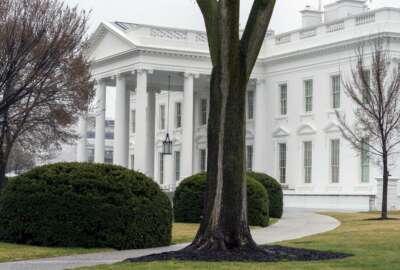The Army sets its sights on Gen Z
In today's Federal Newscast, the Army Enterprise Marketing Office is modernizing its efforts to help reach Generation Z.
- The federal government is calling on technology workers to consider government service. The Office of Personnel Management is hosting a “Tech to Gov” virtual job fair on October 24. Agencies held their first “Tech to Gov” job fair in January. It started an effort to recruit out of work tech professionals following sector-wide layoffs in private industry. The federal government sought to hire 22,000 tech workers in fiscal 2023. (Tech to Gov virtual job fair - Office of Personnel Management)
- Agencies have resources to help them meet the Biden administration's diversity, equity, inclusion and accessibility requirements. Some agencies are still working through the early stages of their DEIA goals. But the Office of Personnel Management is trying to meet agencies where they are. OPM's Janice Underwood is the first-ever governmentwide chief diversity officer. “Everyone is situated differently and everyone has different challenges,” Underwood said. OPM has a host of resources and DEIA guidance for agencies, Underwood said. And her team offers both technical assistance and office hours to agencies who might be struggling.(OPM’s Underwood aims to help agencies reach next level of DEIA workforce goals - Federal News Network)
- The White House will soon be accepting applications for its annual summer internship program. The application period begins on Oct. 16 for current or recently graduated college students. Those accepted to the program will begin their internships in June 2024. Just last year, the White House began paying its summer interns for the first time ever. It's part of a larger effort from the Biden administration to reduce agencies' reliance on unpaid internships.
- Agencies receive new guidelines for writing regulations that don't inhibit competition. As agencies write new or update current regulations, they must analyze how these changes could influence competition. New requirements from the Office of Management and Budget's Office of Information and Regulatory Affairs tells agencies to design regulations that promote competition while also achieving important policy goals. The 31-page memo is split into two sections. The first provides an overview of why considering these effects are important, including a list of questions to help determine if a regulation may have significant effects on a market. The second part provides more technical background for analysts on the factors that influence the competitiveness of markets.(OIRA guidelines on enhancing competition in regulations - Office of Management and Budget)
- Agencies release new supply chain security rules for contractors. Federal contractors will need to pay close attention to whether the government is banning risky technologies. That’s according to a new acquisition rule published this month. Any directive to exclude or remove certain products from federal systems will come courtesy of the Federal Acquisition Security Council. That group was established by Congress to address supply chain security threats across government. (New rule sets stage for banning technologies from government supply chains - Federal News Network)
- Preparations for the 6th annual President’s Cup Cybersecurity Competition are underway and the Cybersecurity and Infrastructure Security Agency is looking for some help. CISA released a request for information and draft statement of work seeking an industry partner to help develop and run the annual federal employee competition. CISA is looking for feedback on everything from developing the individual and team cyber challenges to the application the contest will run on to the hosting environment for the entire competition. Comments on the RFI are due by October 20.
- Could robots speed up security screening lines at the airport? The Department of Homeland Security’s Science and Technology directorate is exploring the idea. The robotic system for security inspection would eliminate the need for security personnel to inspect, swab and scan suspicious bags and other items. The envisioned system would feature robotic arms that could automate the inspection process. DHS is seeking a license or collaborative research and development agreement to help advance the concept. (Robotic system for security inspections - Department of Homeland Security)
- Congressional Democrats are calling for greater civil rights protections from artificial intelligence. The Biden administration is working on a new executive order on AI. Now five senators and 11 members of Congress are asking the White House to focus it on stricter rules of the road for AI use. The lawmakers say AI algorithms have incorrectly flagged people for fraud, and denied them government benefits. The White House released a blueprint for an AI Bill of Rights last year, addressing many of the lawmakers’ concerns. But lawmakers are telling the White House to codify the Bill of Rights into the upcoming EO. (Letter to President Joe Biden - Sen. Ed Markey (D-Mass.))
- The Defense Department wants to use biotechnology to improve how it performs, meet future challenges and stay ahead of competitors. The department recently launched the Biofabrication Technician Registered Apprenticeship Program to meet this goal and improve workers’ skills. The program is part of its BioFabUSA manufacturing innovation institute. This will integrate cell and tissue cultures with biofabrication, automation, robotics and other technologies to advance research and tools. Initially, the apprenticeship program will focus on recruiting veterans.(Defense Department creates biofabrication apprenticeship program - Defense Department)
- The Army Enterprise Marketing Office is modernizing marketing efforts to help reach Generation Z. The office is utilizing research and data to target Gen Z. It is also leveraging policies, programs and benefits, such as the Future Soldier prep course and recruiting incentives, and the new structure the secretary and the chief of staff of the Army recently announced. Specifically, AEMO will fall under the Army Recruiting Command. AEMO plans a new campaign focused on civilians. While current efforts are focusing on recruiting, the office stated it might look into influencer marketing in the future. (Army wants to reach Gen Z with tailored marketing - AUSA 2023)
Copyright © 2024 Federal News Network. All rights reserved. This website is not intended for users located within the European Economic Area.
Eric White
Eric White is news anchor and Federal Drive producer at Federal News Network.
Follow @FEDERALNEWSCAST






